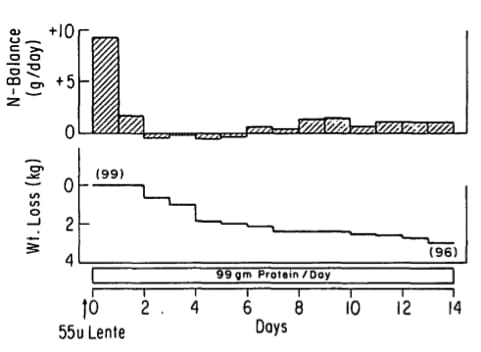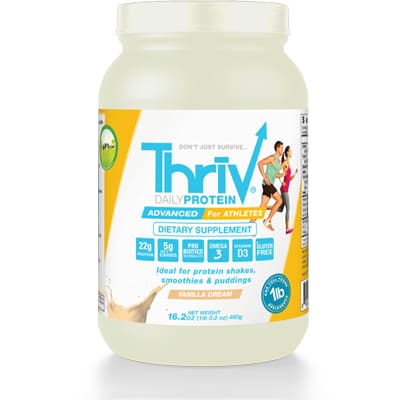Bariatric Surgery Patients Will Thrive on Thrīv
While it is possible to reverse diabetes with nothing but lifestyle interventions, Roux-en-Y Gastric Bypass (RYGB) surgery, i.e. the surgical reduction of the size of your stomach to a small walnut- to egg-sized pouch, is currently the most effective strategy to reverse both obesity and type II diabetes (Cummings et al. (2009), for example, report remission rates of 84%).
As with every surgical intervention, however, RYGB surgery is not without side effects; and in contrast to the inability to overeat, the reduction in nutrient absorption which is a necessary and inevitable consequence of weight loss surgery is a phenomenon, the far-reaching effects of which RYGB patients still tend to underestimate.
Starving in abundance
While it is still relatively well-known that the significantly reduced macro- and micronutrient absorption puts RYGB surgery patients at a significantly increased risk of ending up with low levels of several vital minerals and vitamins (Alvarez-Leite. 2004; Bernert. 2007; Ahima. 2016). It is often overlooked by both, doctors and patients, that the reduced stomach size and its consequences, which include both, the lack of pre-acidification in the stomach and a mere mechanical inability to consume a wide range of high protein foods, will also decrease the amount of vital protein and essential amino acids an RYGB patient can derive from his diet.
Needless to say that this is seriously bad news for someone who does not simply strive to lose weight, but wants to cut body fat, while maintaining or even gaining lean muscle mass. In this situation, a reduction in protein intake or digestion is the last thing you would want. After all, high protein intakes or, more importantly, the actual absorption of high amounts of essential amino acids from the diet have been shown to help you lose fat while maintaining lean muscle mass, the metabolic currency of your body of which countless studies prove that it is also a necessary prerequisite of sustained weight and, more importantly, fat loss (Westerterp-Plantenga. 2004; Layman. 2009, etc.).
Losing weight before surgery: Another thing to consider is the fact that some people have to lose weight before they can even undergo surgery. Sometimes this is necessary to convince your insurance company that it's worth spending money on you and you are not a basket case. Sometimes, it is simply a matter of medical necessity.
Whatever it may be for you, there is no doubt that it makes sense to follow the recommendation European Society of Endocrinology to consume at least "60–120 g protein daily to maintain lean body mass during weight loss and long-term maintenance"(Torres. 2011).
And this is where Thriv should come in even before your surgery: With its high nutrient and low energy content, Thriv can help you achieve the desired pre-surgery weight loss, too. By replacing one or several of your regular meals with Thriv and thus going on a protein-modified fast, you can lose significant amounts of body fat without hunger (Wadden. 1986) or compromising your metabolically active lean mass (Bistrian. 1976), even before the day of your RYGB surgery!

In fact, studies in RYGB patients clearly indicate that the average patient will, often despite better knowledge, reduce his protein intake after the surgery, involuntarily (Brolin. 1994). This reduction in protein intake is not without consequences: it will increase the risk of losing protein, i.e. muscle and organ, instead of fat mass (Katsanos. 2016) and thus trigger a cascade of negative effects ranging from something as profane as a reduced physical attractiveness to health-relevant reductions in muscle mass that border full-blown sarcopenia - with all its symptoms, such an increase in fibrosis, changes in muscle metabolism, oxidative stress, and the degeneration of the neuromuscular junction which will ultimately lead to progressive loss of muscle function and frailty.Patients who have undergone weight loss surgery are thus facing a dual problem: They are firstly, required to eat more protein, because the surgery reduces the absorption of this vital and highly anabolic macronutrient from their diet; and they are secondly struggling to eat more high protein foods for simple, mechanic reasons – a delicious steak, as tender as it may be, is after all, something the walnut- to egg-sized stomach of an RYGB patient will have a really hard time to handle.
Needless to say that you want avoid this from happening at all costs. Fortunately, "[c]hanging current dietary practices towards increasing ingestion of essential amino acids" as it is suggested by Katsanos et al. in their recently published paper with the telling title "Essential amino acid ingestion as an efficient nutritional strategy for the preservation of muscle mass following gastric bypass surgery" constitutes an approach to "prevent [the] loss of lean and [to] ultimately achieve more sustained level[s] of health in patients that have undergone gastric bypass" (Katsanos. 2016) surgery.

Thriving on Thriv
With its high extremely high content of essential amino acids from Thriv's unique combination of dairy proteins from Whey Protein Concentrate (WPC), Milk Protein Isolate (MPI), and colostrum, its unique content of free form amino acids, its excellent taste and the reasonable amounts of the RYGB deficiency nutrients, omega-3 (DHA + EPA), vitamin A, D, calcium and iron, Thriv constitutes the perfect high protein food supplement to complement or replace your pre- and post-RYGB diet.
With its low energy content (only 130 calories, 2 grams of fat and only 5 grams of net carbs) Thriv blends perfectly into both low fat and low carbohydrate diets; and the added digestive support in form of 100 Milligrams of protease enzymes and 350,000,000 CFU’s of live (!) probiotics per serving of Thriv ensure that your disadvantaged digestive tract can actually use all its health- and fat-loss-promoting ingredients without being messed up by a truckload of artificial sweeteners, colors and preservatives and/or the inconspicuous thickeners and gums that may render other protein powders literally indigestible for someone with a walnut- to egg-sized stomach.
References:
Ahima, Rexford S., and Hyeong-Kyu Park. "Bariatric Surgery 45." Metabolic Syndrome (2016): 811.
Alvarez-Leite, Jacqueline I. "Nutrient deficiencies secondary to bariatric surgery." Current Opinion in Clinical Nutrition & Metabolic Care 7.5 (2004): 569-575.
Bernert, C. Poitou, et al. "Nutritional deficiency after gastric bypass: diagnosis, prevention and treatment." Diabetes & metabolism 33.1 (2007): 13-24.
Bistrian, Bruce R., et al. "Nitrogen metabolism and insulin requirements in obese diabetic adults on a protein-sparing modified fast." Diabetes 25.6 (1976): 494-504.
Cummings, D. E. "Endocrine mechanisms mediating remission of diabetes after gastric bypass surgery." International journal of obesity 33 (2009): S33-S40.
Katsanos, Christos S., James A. Madura, and Lori R. Roust. "Essential amino acid ingestion as an efficient nutritional strategy for the preservation of muscle mass following gastric bypass surgery." Nutrition 32.1 (2016): 9-13.
Layman, Donald K., et al. "A moderate-protein diet produces sustained weight loss and long-term changes in body composition and blood lipids in obese adults." The Journal of nutrition 139.3 (2009): 514-521.
Wadden, T. A., et al. "Less food, less hunger: reports of appetite and symptoms in a controlled study of a protein-sparing modified fast." International journal of obesity 11.3 (1986): 239-249.





































































































